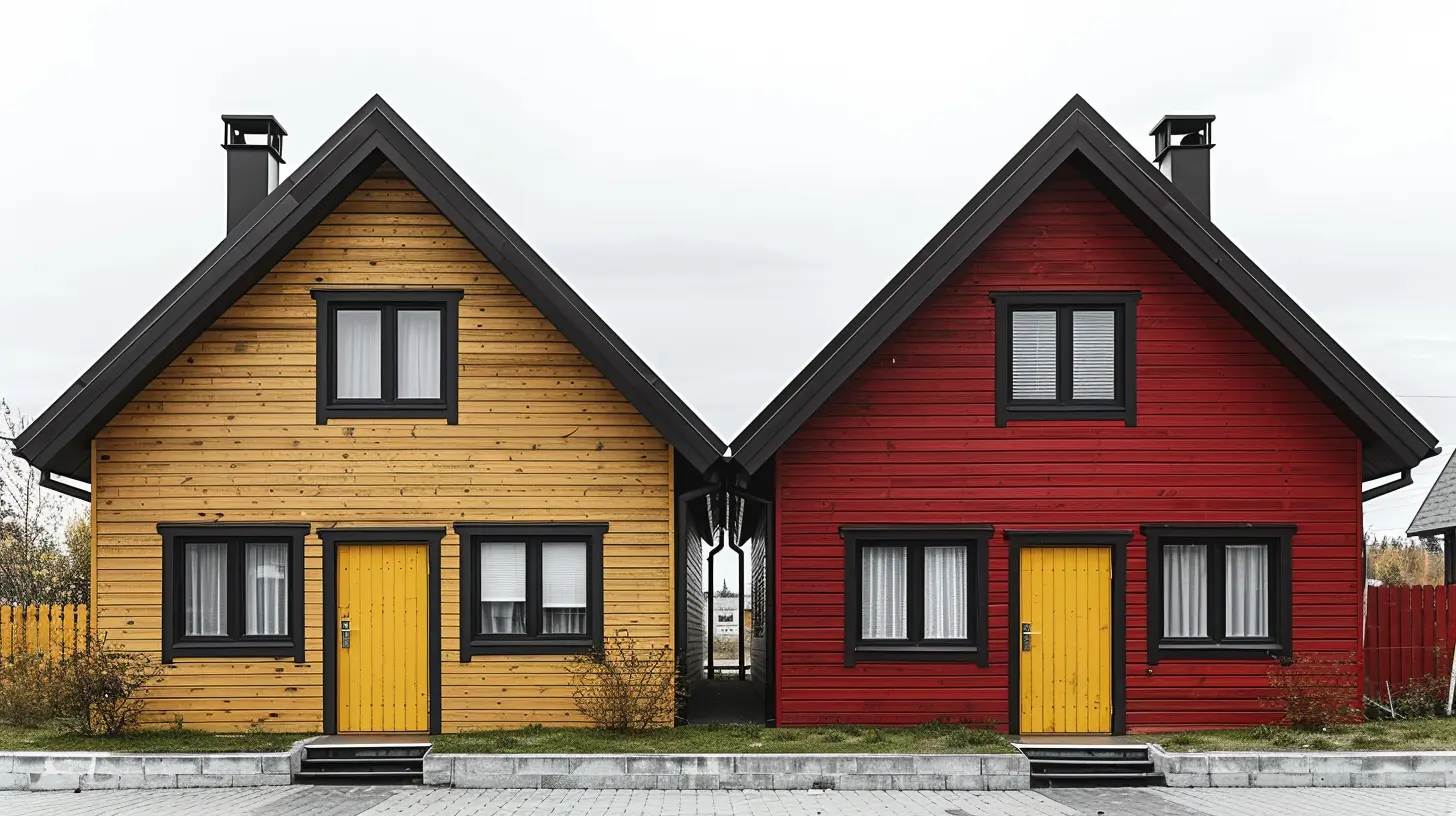Short-Term vs. Long-Term Rentals: What’s Right for You?
28 November 2024
If you’re thinking of diving into the rental property game, you’re probably wrestling with one big question: should you go with short-term or long-term rentals? This is a common dilemma many landlords and property investors face, and let’s be honest—it’s not a one-size-fits-all decision. Determining which option is best for YOU heavily depends on your goals, your property, your lifestyle, and maybe even your tolerance for a little chaos.
In this article, we’ll break down everything you need to know about short-term and long-term rentals so you can make an informed decision without losing sleep over it. Let’s get into it!
What Are Short-Term and Long-Term Rentals?
Before we dive into pros and cons, let’s make sure we’re all on the same page about what short-term and long-term rentals actually are.Short-Term Rentals
Short-term rentals (STRs) are properties rented out for brief periods, generally under 30 days. Think vacation homes, Airbnb setups, or furnished apartments for business travelers. These rentals are designed for temporary stays and often cater to tourists, seasonal workers, or anyone looking for a place to crash for a few nights or weeks. They tend to be fully furnished and loaded with amenities.Long-Term Rentals
Long-term rentals (LTRs), on the other hand, are leased out for extended periods—typically six months or longer. This is your classic landlord-tenant arrangement. Most long-term rentals don’t require furniture, and tenants are responsible for their own utilities and day-to-day upkeep.Both options can be lucrative and offer their own set of perks, but they also come with their fair share of challenges. Let’s dig deeper.
The Pros and Cons of Short-Term Rentals
Short-term rentals might sound glamorous, especially when you think about turning your space into that Instagram-worthy vacation spot. But here’s the deal: they’re not for everyone, and they come with some serious considerations.Pros of Short-Term Rentals
1. Higher Income Potential: If your property is in a hot tourist spot or a prime urban location, short-term rentals can bring in significantly more money than a long-term lease. You can charge nightly rates that add up quickly.2. Flexibility: Need your property for personal use? With short-term rentals, you can block off dates and have access to your space whenever you want.
3. Diverse Audience: You get a mix of travelers, professionals, and adventurers staying in your home. It can be exciting to meet new people (if you enjoy social interactions).
4. Tax Benefits: There are specific tax deductions available for short-term rental properties, including expenses for maintenance, cleaning, and even some travel-related costs.
Cons of Short-Term Rentals
1. Seasonal Demand: Income from short-term rentals can be inconsistent. Off-seasons can leave your property sitting empty for weeks or even months.2. Higher Maintenance Costs: Frequent guests mean more wear and tear, along with constant cleaning between stays. Think of it like running a mini-hotel!
3. Stricter Regulations: Some cities and neighborhoods are cracking down on short-term rentals, requiring permits, restricting stays, or banning them altogether.
4. Time-Intensive: Managing bookings, responding to guest inquiries, and coordinating cleanings can feel like a full-time job (and maybe not the one you signed up for). 
The Pros and Cons of Long-Term Rentals
Long-term rentals, while less glamorous than their short-term counterparts, offer stability and a more hands-off approach. But like any investment, they come with their own set of challenges.Pros of Long-Term Rentals
1. Steady Income: With long-term leases, you’re guaranteed monthly rent for the duration of the agreement. It’s consistent and reliable.2. Less Day-to-Day Management: Once a tenant is settled, you don’t have to worry about constant turnovers or daily guest communication.
3. Lower Costs: Tenants are usually responsible for utilities, minor repairs, and routine maintenance, which means fewer expenses for you.
4. Predictable Regulations: Unlike short-term rentals, long-term rentals generally face fewer zoning or legal challenges.
Cons of Long-Term Rentals
1. Lower Revenue Potential: While steady, the income from long-term rentals might not match the earning potential of a high-performing short-term property.2. Tenant Issues: One bad tenant can cause headaches. Late payments, property damage, or eviction battles are rare but not impossible.
3. Lack of Flexibility: Once you’ve locked in a tenant for a year, the property is essentially off-limits for your own use.
4. Less Glamorous: If you’re someone who dreams of a Pinterest-worthy property with constant guest feedback, long-term rentals may feel a little… dull. 
Factors to Consider When Choosing Between Short-Term and Long-Term Rentals
Not sure which path to take? Here are some key factors to weigh before making your decision:1. Location, Location, Location
Where is your property? If it’s in a bustling tourist hub or a desirable vacation destination, short-term rentals might be a gold mine. On the flip side, if it’s in a suburban neighborhood or a college town, long-term rentals likely make more sense.Think about demand. A beach house in the summer is ideal for short-term rentals, but if it’s an hour out of the city with no nearby attractions, long-term tenants might be your safest bet.
2. Your Personal Goals
Are you in it for the income, or do you want flexibility to use the property? If you’re looking for maximum profit and don’t mind being hands-on, short-term rentals could work wonders. Want peace of mind and minimal involvement? Go long-term.3. Your Time Commitment
Let’s not sugarcoat it—short-term rentals are time-consuming. Unless you hire a property manager (which eats into your profits), you’ll be juggling guest issues, cleaning services, and marketing. Long-term rentals, on the other hand, are more of a “set it and forget it” deal.4. Legal and Regulatory Issues
Research local laws! Short-term rentals are heavily regulated in many cities, and you don’t want to get hit with fines or cease-and-desist orders. Long-term rentals generally face fewer hurdles but still require compliance with housing laws.5. Your Budget
Short-term rentals involve higher upfront costs, from furnishings to marketing. Long-term rentals are usually less expensive to get started with, especially if the property is already in good shape.Which Renting Style Fits YOU?
Still on the fence? Let’s break it down:- Go Short-Term If…
You’re comfortable with inconsistency, hands-on management, and investing in high guest turnover. This option is perfect for properties in prime vacation spots or cities with high tourism demand.
- Go Long-Term If…
You’re looking for stability, minimal involvement, and steady returns. It’s great for people who aren’t interested in running a hospitality business and want to keep things simple.
Hybrid Approach: Why Not Both?
Ever thought about mixing things up? Some landlords strike a balance by doing long-term rentals during off-seasons and switching to short-term rentals during peak times. It’s not always easy to pull off, but it can maximize your property’s earning potential.Final Thoughts
At the end of the day, the “right” choice boils down to what works best for you and your property. Short-term rentals can feel like a thrill ride, packed with highs (big paydays) and lows (off-season lulls). Long-term rentals, however, are more like a steady relationship—reliable and stable but sometimes lacking excitement.There’s no wrong answer here, and plenty of property owners find success with both options. The key is to do your homework, know your market, and make a decision that aligns with your goals.
Ready to take the plunge? Whether you go short-term, long-term, or a mix of both, just remember: you’ve got this!
all images in this post were generated using AI tools
Category:
Rental PropertiesAuthor:

Travis Lozano
Discussion
rate this article
17 comments
George McLaurin
In the dance of time and space, short stays spark fleeting grace, while long embraces root and grow. Choose your rhythm, let your heart flow— each path a story, unique and true, what's right, dear reader, lies with you.
February 14, 2025 at 12:57 PM

Travis Lozano
Thank you for beautifully capturing the essence of choosing between short-term and long-term rentals! Each option has its unique benefits, and finding the right fit truly depends on individual needs and circumstances.
Yasmine Pope
Renting: a sprint or marathon?
February 3, 2025 at 3:58 AM

Travis Lozano
Renting can be both; short-term rentals are a sprint for quick gains, while long-term rentals are a marathon focused on stability and steady income. Choose based on your goals!
Sloan Martinez
Great article! It’s so exciting to explore the pros and cons of both short-term and long-term rentals. Finding the perfect fit can lead to amazing adventures and happy homeowners! Keep shining! 🌟
January 29, 2025 at 3:35 AM

Travis Lozano
Thank you for your kind words! I'm glad you enjoyed the article and found it insightful. Happy renting! 🌟
Maura Riley
Consider your lifestyle and investment goals carefully. Short-term rentals offer flexibility and higher returns, while long-term rentals provide stability and consistent income. Choose what aligns best with your vision.
January 22, 2025 at 11:43 AM

Travis Lozano
Thank you for highlighting the importance of aligning investment strategies with individual goals! Each option has its unique benefits, and careful consideration is key to success.
Alexander Hall
When it comes to rentals, it’s all about your vibe! Short-term rentals are like a fun vacation fling, while long-term rentals are the cozy commitment. Choose wisely, and may your property journey be filled with happiness, good vibes, and great tenants! 🏡✨
January 16, 2025 at 8:48 PM

Travis Lozano
Thank you for your insightful perspective! Choosing between short-term and long-term rentals truly does hinge on the vibe you’re seeking. Here’s to happy renting! 🏡✨
Vex McCune
Why choose between short and long-term rentals? Go bold: mix them up! Flexibility is key, darling. Make your property work for you—because who wants to be tied down?
January 13, 2025 at 9:17 PM

Travis Lozano
Absolutely! Mixing short and long-term rentals maximizes flexibility and income potential. It's all about finding the right balance that suits your property and lifestyle!
Kaitlyn McCord
Choosing between short-term and long-term rentals can feel overwhelming. It's important to consider your unique situation, lifestyle, and financial goals. Remember, whatever you decide, it's a step toward finding what best fits your needs and aspirations. You’ve got this!
January 9, 2025 at 1:17 PM

Travis Lozano
Thank you for your insightful comment! It's crucial to weigh your options based on personal circumstances. Trusting your instincts will lead you to the best choice for your needs!
Selina Hodge
Short-term rentals can yield quick profits, but they demand constant management and marketing hustle. Long-term rentals provide stability and predictable income with less stress. Choose what aligns with your lifestyle and goals—don’t let market trends dictate your choices. Trust your instincts and commit to the strategy that suits you best!
January 5, 2025 at 5:43 AM

Travis Lozano
Thank you for your insights! It's crucial to weigh both options carefully and choose the rental strategy that best fits your lifestyle and goals. Your perspective on stability versus hustle is much appreciated!
Cara Hill
Choosing between short-term and long-term rentals can be challenging. It's important to consider your personal circumstances and goals. Remember, there's no one-size-fits-all solution—what matters most is finding the option that aligns with your needs.
December 27, 2024 at 8:59 PM

Travis Lozano
Absolutely! Tailoring your rental choice to your unique circumstances is key. Each option has its pros and cons, so weigh them carefully to find what best fits your needs.
Ariella Murphy
Choosing between short-term and long-term rentals depends on your goals, lifestyle, and the local market dynamics.
December 24, 2024 at 3:33 AM

Travis Lozano
Absolutely! Understanding your goals and the local market is key to making the best choice between short-term and long-term rentals.
Makayla McVicker
Choosing between short-term and long-term rentals depends on your financial goals, lifestyle, and market demand. Assess carefully!
December 22, 2024 at 12:08 PM

Travis Lozano
Thank you for your insightful comment! It's crucial to align rental choices with individual goals and market conditions.
Flora Moses
Great insights! Choosing between short-term and long-term rentals really depends on your financial goals.
December 18, 2024 at 12:42 PM

Travis Lozano
Thank you! Absolutely, aligning rental choices with your financial goals is key to making the right decision.
Darby Hodge
In the shadowy realm of real estate, the choice between short-term and long-term rentals holds secrets. Are you ready to unlock the hidden potential of your property investment?
December 12, 2024 at 7:54 PM

Travis Lozano
Absolutely! Understanding the nuances of short-term and long-term rentals is key to maximizing your property's potential. Each has its unique benefits and challenges—let's explore what aligns best with your investment goals!
Chase McLemore
Choose short-term for cash flow, long-term for stability—make your move!
December 6, 2024 at 5:57 AM

Travis Lozano
Great point! Balancing short-term cash flow with long-term stability is key to making the best rental decision.
Soren McGeehan
Great article! It’s so helpful to weigh the pros and cons of short-term vs. long-term rentals. Finding the right fit can really make a difference in your investment success!
December 3, 2024 at 9:34 PM

Travis Lozano
Thank you! I'm glad you found it helpful in making informed investment decisions!
Xander Hensley
In evaluating short-term versus long-term rentals, consider your investment goals, market demand, and property management capabilities. Short-term rentals can yield higher returns but require active management and adaptability. Conversely, long-term rentals offer stability and less volatility. Ultimately, your choice should align with your financial objectives and lifestyle preferences.
November 30, 2024 at 4:08 AM

Travis Lozano
Thank you for your insightful comment! It's crucial to weigh your investment goals, market conditions, and management resources when choosing between short-term and long-term rentals. Each has its unique advantages that cater to different financial strategies and personal lifestyles.
Rook Ward
Rentals: Quick cash vs. couch!
November 29, 2024 at 12:28 PM

Travis Lozano
Great point! Short-term rentals can provide quick cash flow, but long-term rentals offer stability and consistency. It ultimately depends on your financial goals and lifestyle preferences!
MORE POSTS

Selling a Home with Kids: How to Keep Things Organized

How Zoning Laws Influence Affordable Housing Availability

How to Use Data to Improve Your Property Management Strategies

Solar Panels 101: What Homeowners Should Know

Minimizing Vacancy Rates: Strategies to Always Keep Your Properties Rented

Renting Long-Term: How to Build a Strong Tenant-Landlord Relationship

From Novice to Pro: Scaling Your Real Estate Portfolio

The Crucial Role of Photography in Selling Your Home

Selling a Condo: Tips for First-Time Sellers

How to Market Your Home Effectively in a Digital World

How to Negotiate Rent Like a Pro